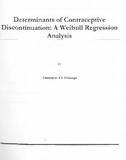| dc.description.abstract | This is a study to examine the overall discontinuation rate and factors associated with contraceptive
discontinuation among women of reproductive age group between 15 to 49 years in Kenya using
data from 2003 KDHS. The Weibull regression model is used to analyze the determinants of
discontinuation for all methods combined. According to the findings, the overall all method
discontinuation rate is 44.1 percent for the five-year period before the survey and the risk of all
method discontinuation increases with time. The results show that age (15-24), Region (Nyanza,
Western), Education (No education), Number of Living Children (0) and Marital Status (never
married, not living together, divorced, widowed) significantly affect discontinuation in the
contraceptive practice of Kenyan women.
The study suggests that during the design and implementation of reproductive health strategies,
methods that help delay the onset of childbearing should be emphasized | en |

